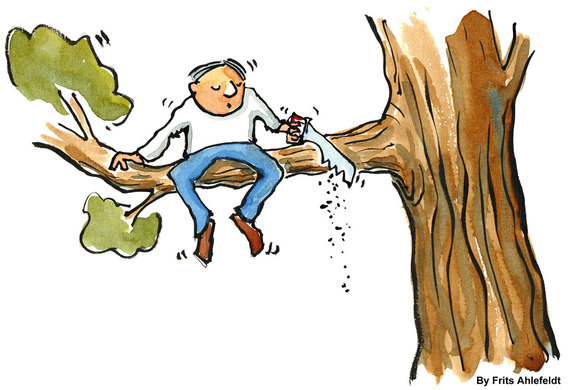Getting in the way of ourselves -- or, as some call this state, being our own worst enemy -- has been around since the dawn of man. Modern psychology calls this condition the self-sabotaging syndrome. Sadly, self-sabotaging behavior seems to be ingrained in human nature.
According toPsychology Today (http://www.psychologytoday.com/basics/self-sabotage), self-sabotaging behavior comes in many forms, from procrastinating, to self-medicating with one drug or another, to finding solace in comfort foods instead of exercise or to unconsciously inflicting self-injurious habits. Ongoing patterns of destructive behavior "undermine us, especially when we engage in them repeatedly."
Yet, on a broader spectrum, what happens when you self-sabotage is a profound interference with your values and your long-standing goals. Even if you realize that you are interfering with the best of who you are, there is no guarantee that you will stop self-sabotaging behavior. It's a constant temptation.
I spent the last week under a kind of self-sabotaging frustration, and it wasn't fun. I tried to reset the stove clock after a power outage, and for the life of me, I couldn't do it. But I stayed with it for days and finally figured it out. For some unknown reason, my odometer decided to re-calibrate itself and lose about 8,000 miles. I read the owner's manual a dozen times to no avail. I couldn't move the odometer to the mileage that previously flashed on my dash. Final solution after a week: I took the car into the dealership. Problem solved.
In two instances above, I solved my problems despite directions not being clear or even correct. I refused to be the victim of circumstances and refused to give up solving my problem. I intentionally refused to be a victim of a self-sabotaging mindset.
I don't work at an office either, but I can imagine that every day, several times a day the self-sabotaging syndrome rears its ugly head. After spending hours and hours following directions for a specific program, you never achieved results. It just didn't work. You simply cannot actualize a positive outcome. You complain and you insist the directions were wrong. Are you the victim?
Wouldn't it be awesome if there were some sort of turn off valve, some barrier that would protect you from needless emotional struggles and set you on a path of actualizing your full human potential?
According to the online magazine PsychAlive, Psychology for Everyday (http://www.psychalive.org/self-sabotaging), knowing where self-sabotaging thoughts come from can be the first step in controlling your self-defeating behaviors. Everyone hides a myriad of childhood influences and experiences that make you your own worst enemy. There are also behavioral therapies aimed at interrupting ingrained self-sabotaging patterns of stopping thought; that is, interrupting thought, letting thoughts go or redirecting thoughts into positive statements.
No one can teach you to dance if you don't want to learn. And no one can teach you how to eliminate self-defeating mindsets if you insist on them. And no one can teach you not to give up but YOU.
Since everyone is a talented individual with natural gifts given to you from birth, you can teach yourself to resist self-sabotaging behavior by channeling and strengthening your talents and abilities in the direction of solving problems with positive commitment. That's when happiness and personal satisfaction ring true.
Focus on the following mutually supportive 3Rs to finally, once and for all, eliminate the self-sabotaging syndrome:
1.Resourcefulness
Resourcefulness implies the ability to move through difficult situations. It does not imply that there will necessarily be a successful outcome or that you'll have the ability to solve a problem with ease. The skill of being resourceful encompasses the ability to access your imagination, your inventiveness, and the aptitude to think beyond the situation that involves the difficulty.
2. Resilience
Psychology Today defines resilience "as that ineffable quality that allows some people to be knocked down by life and come back stronger than ever. Rather than letting failure overcome you and drain your resolve, you find a way to rise from the ashes." Resilience implies adaptation to adversity. "It also implies the ability to endure past the point of giving up" in the face of difficulty.
3. Resoluteness
There is an element of tenacity, steadfastness and competence in problem solving. Resoluteness implies a strong tolerance for finding solutions even in the face of adverse responses. For example, overcoming an upsetting situation is a dynamic response to what might seem to be an impossible situation. Yet, this is how all the signifiant contributions in math, science, medicine and technology have been created in the history of the world.
Finding solutions to solving challenging problems or forging through life's adversities can be a rewarding and positive experience. Implementing the 3Rs -- resourcefulness, resilience and resoluteness -- can be an enormously helpful checkpoint in eliminating self-sabotaging behavior. The 3Rs will also provide increased focus on your most important goals and values.
Joan Moran is a noted creative though leader. She commands the stage with her delightful humor, raw energy, and wealth of life experiences. She is an expert on wellness and is passionate about addressing the problems of mental inertia. A yoga instructor, Moran is the author is 60, Sex, Tango, Confessions of a Beatnik Boomer.
Visit her website at: www.joanfrancesmoran.com
Follow Joan Moran on Twitter: www.twitter.com/joanfmoran
Open all references in tabs: [1 - 4]
